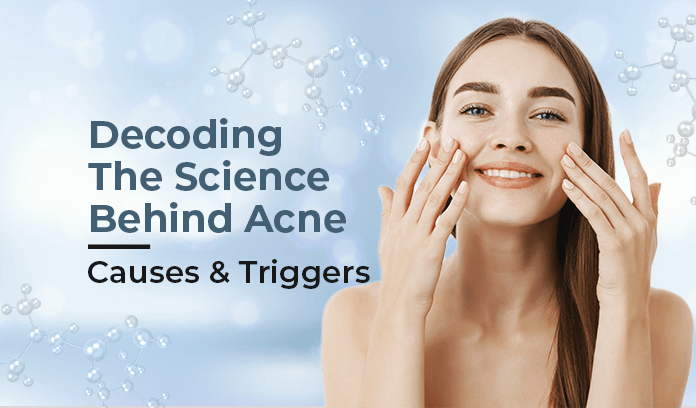Regardless of age and gender, Acne continues to be a skin condition affecting millions around the world. While it may seem like a trivial skincare issue, it can significantly affect one’s self-esteem and public perception.
To effectively combat acne conditions, it is important to understand or decode the science behind its causes and triggers.
Primary Cause of Acne
At its core, breakouts or acne formation results from excessive sebum production and clogging of pores. Combined with the presence of dead skin cells, the growth of acne-causing bacteria in the skin leads to inflammation. This results in the formation of blackheads, whiteheads, and pimples.
Several factors contribute to the development of acne:
- Hormonal changes/imbalances that occur during adolescence play a role in acne formation. As increased androgen levels stimulate sebum production, teens become more prone to breakouts. Fluctuating hormones during menstrual cycle and pregnancy can also trigger acne in women.
- Genetic factors also make individuals more susceptible to acne. Family members who have had a specific skin type, e.g. oily or acne-prone skin lead to more breakouts. If your siblings or parents have had a history of frequent acne formation, you might likely experience a similar skin type or symptoms.
- A balanced diet and lifestyle can greatly determine the quality of your skin. A diet high in consumption of refined and ultra-processed foods can trigger frequent breakouts and inflammation.
- Other factors that exacerbate acne formation include stress and environmental triggers like heat, dust, and air pollution that can stimulate sebaceous glands to produce excess oil. In such an environment, acne-causing bacteria grow stronger and clog pores with dirt to produce blackheads, whiteheads, or pimples.
Prevention & Treatment for Acne
Understanding and decoding the science behind acne empowers us to take proactive and mindful steps towards clearer, better skin.
Consistent skincare routines like gentle cleansing, regular exfoliation, and oil control can help the skin keep pores unclogged. Moreover, professional advice from dermatologists helps us understand our skin type better with personalized products and treatments for acne.
Conclusion
With acne affecting a significant population across the globe, it only makes sense to misspell misconceptions and myths about skincare related to combating this condition.
General awareness of diet, skin types, and hormonal root causes can help people achieve better skin and quality of life.











